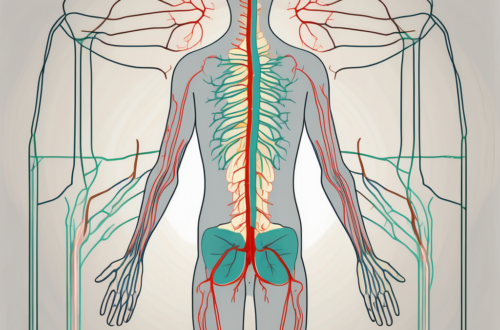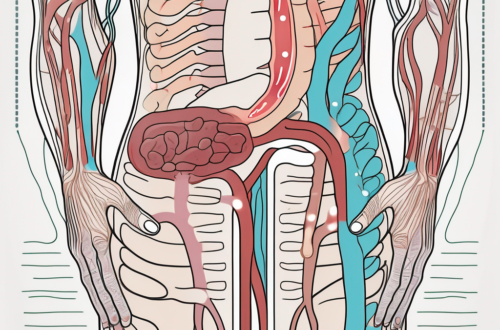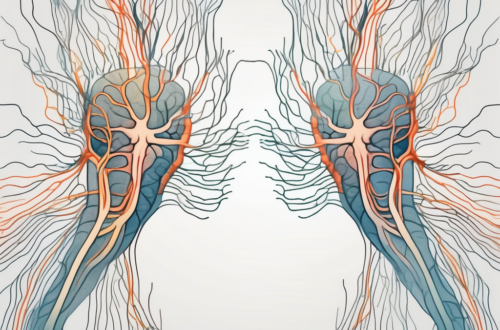The parasympathetic nervous system plays a crucial role in our overall health and well-being. It is responsible for regulating our body’s rest-and-digest response, helping us relax, heal, and recover from stress. But can you actually strengthen the parasympathetic nerve? In this article, we’ll explore the science behind the parasympathetic nervous system, the techniques to potentially enhance its function, and the importance of monitoring your progress.
Understanding the Parasympathetic Nervous System
Before delving into ways to strengthen the parasympathetic nerve, let’s first grasp a basic understanding of its role in our body. The parasympathetic nervous system is one of the two branches of the autonomic nervous system, alongside the sympathetic nervous system. While the sympathetic nervous system controls our fight-or-flight response, the parasympathetic nervous system acts as its counterpart, promoting relaxation and restoration.
The parasympathetic nerve controls various bodily functions such as digestion, blood pressure, heart rate, and respiratory function. It helps to conserve and restore energy, allowing our body to recover from stress and maintain overall balance. By activating the parasympathetic nerve, we can counterbalance the effects of chronic stress and enhance our well-being.
The Role of the Parasympathetic Nerve
The parasympathetic nerve plays a crucial role in maintaining our body’s equilibrium. It is responsible for stimulating the production of saliva, which aids in the digestion process. When the parasympathetic nerve is activated, it signals the release of digestive enzymes and increases blood flow to the digestive organs, promoting efficient nutrient absorption and waste elimination.
In addition to its role in digestion, the parasympathetic nerve also influences our cardiovascular system. When activated, it helps to lower blood pressure and heart rate, reducing the strain on our heart and promoting cardiovascular health. This relaxation response induced by the parasympathetic nerve allows our body to conserve energy and allocate resources to other essential functions.
Furthermore, the parasympathetic nerve plays a vital role in respiratory function. It controls the muscles involved in breathing, ensuring that our breathing rate remains steady and regulated. By activating the parasympathetic nerve, we can promote deep and relaxed breathing, which has a calming effect on our body and mind.
The Connection Between the Parasympathetic Nerve and Overall Health
Studies have shown that a healthy parasympathetic nervous system can have a profound impact on our physical and mental health. When the parasympathetic nerve is functioning optimally, it promotes better digestion, reduced blood pressure, decreased heart rate, improved sleep, and enhanced immune function.
A strong parasympathetic nerve can also help reduce anxiety and improve mood. When we activate the parasympathetic nerve, it triggers the release of neurotransmitters such as serotonin and dopamine, which are known as “feel-good” chemicals. These neurotransmitters play a crucial role in regulating our mood and emotions, promoting a sense of calm and well-being.
Additionally, a robust parasympathetic nervous system enhances our resilience to stress. Chronic stress can have detrimental effects on our physical and mental health, leading to conditions such as anxiety, depression, and cardiovascular diseases. By strengthening the parasympathetic nerve, we can effectively counteract the negative impact of stress, allowing us to better cope with life’s challenges.
In conclusion, understanding the role of the parasympathetic nervous system is essential for promoting overall well-being. By activating and strengthening this vital nerve, we can improve digestion, regulate blood pressure and heart rate, enhance respiratory function, and boost our immune system. Furthermore, a healthy parasympathetic nerve can help reduce anxiety, improve mood, and increase our resilience to stress. Taking steps to support and nurture our parasympathetic nervous system is crucial for maintaining optimal health and achieving a balanced and harmonious state of being.
The Science Behind Strengthening the Parasympathetic Nerve
While we can’t directly strengthen a single nerve in our body, including the parasympathetic nerve, we can take actions to enhance the overall function of our parasympathetic nervous system and promote its optimal activity. Strengthening the parasympathetic nerve involves a holistic approach that incorporates various aspects of our lifestyle.
The parasympathetic nervous system is a crucial component of our autonomic nervous system, responsible for regulating our body’s rest and digest response. It works in opposition to the sympathetic nervous system, which triggers the fight or flight response. By strengthening the parasympathetic nerve, we can promote a state of relaxation and calmness, allowing our body to recover and rejuvenate.
The Biological Process of Strengthening Nerves
Our bodies have an innate ability to adapt and change, a phenomenon known as neuroplasticity. This means that certain lifestyle changes and practices can positively influence our nervous system, including the parasympathetic nerve. Engaging in activities that reduce stress, such as deep breathing exercises, can help activate the parasympathetic nervous system, leading to its enhanced function over time.
Deep breathing exercises, such as diaphragmatic breathing or alternate nostril breathing, stimulate the vagus nerve, a major component of the parasympathetic nervous system. When the vagus nerve is activated, it releases neurotransmitters like acetylcholine, which promote relaxation and decrease heart rate and blood pressure. Regular practice of these techniques can strengthen the parasympathetic nerve pathways, making them more efficient and responsive.
In addition to deep breathing exercises, other relaxation techniques like meditation, yoga, and progressive muscle relaxation can also activate the parasympathetic nervous system. These practices help reduce the production of stress hormones like cortisol and increase the release of endorphins, the body’s natural feel-good chemicals.
The Impact of Lifestyle on Nerve Strength
Your lifestyle plays a significant role in the strength and efficiency of your nerves, including the parasympathetic nerve. Factors like diet, exercise, sleep, and stress management can directly influence the activity of your parasympathetic nervous system. A balanced diet rich in nutrients, regular physical activity, adequate sleep, and stress-reduction techniques can all support the optimal functioning of the parasympathetic nerve.
When it comes to diet, consuming foods that are high in antioxidants, such as fruits and vegetables, can help protect the nerves from oxidative stress and inflammation. Omega-3 fatty acids found in fatty fish, flaxseeds, and walnuts have also been shown to support nerve health and function.
Regular exercise not only improves cardiovascular health but also enhances the function of the parasympathetic nervous system. Engaging in activities like walking, swimming, or cycling can help regulate heart rate variability, a marker of parasympathetic activity. Aim for at least 30 minutes of moderate-intensity exercise most days of the week to reap the benefits.
Sleep is another crucial factor in maintaining a healthy parasympathetic nervous system. During sleep, the body repairs and restores itself, allowing the parasympathetic nerve to function optimally. Aim for 7-9 hours of quality sleep each night to support nerve strength and overall well-being.
Lastly, managing stress is essential for promoting the health of the parasympathetic nerve. Chronic stress can lead to an overactive sympathetic nervous system, which can negatively impact the parasympathetic response. Implementing stress-reduction techniques like mindfulness, journaling, or engaging in hobbies can help restore balance and strengthen the parasympathetic nerve.
By adopting a holistic approach that encompasses various lifestyle factors, we can enhance the function of the parasympathetic nerve and promote overall well-being. Remember, it’s not just about strengthening a single nerve, but rather creating an environment that supports the optimal functioning of our entire nervous system.
Techniques to Strengthen the Parasympathetic Nerve
While there is no magic pill to instantly strengthen the parasympathetic nerve, there are several techniques you can incorporate into your daily routine to promote its optimal function and enhance overall well-being.
The parasympathetic nervous system, often referred to as the “rest and digest” system, plays a crucial role in maintaining balance in the body. It helps regulate various bodily functions, including heart rate, digestion, and relaxation. By strengthening this system, you can experience improved stress management, better digestion, and a greater sense of calm.
Breathing Exercises and Their Effect on the Parasympathetic Nerve
Deep breathing exercises, such as diaphragmatic breathing or box breathing, can activate the parasympathetic nervous system and induce a relaxation response. By taking slow, deep breaths and focusing on your breath, you can help reduce stress, lower blood pressure, and promote a sense of calm.
When you engage in deep breathing, you stimulate the vagus nerve, which is a key component of the parasympathetic nervous system. This nerve helps regulate the body’s response to stress and promotes a state of relaxation. By incorporating deep breathing exercises into your daily routine, you can strengthen the parasympathetic nerve and improve your body’s ability to handle stress.
The Role of Diet in Nerve Strength
While diet alone cannot directly strengthen the parasympathetic nerve, nourishing your body with a balanced, nutrient-rich diet can support overall nervous system health. Incorporate whole foods, such as fruits, vegetables, whole grains, healthy fats, and lean proteins, into your meals. These foods provide essential vitamins, minerals, and antioxidants that help support nerve function and reduce inflammation.
Additionally, certain nutrients have been found to have a positive impact on the parasympathetic nervous system. For example, foods rich in omega-3 fatty acids, such as fatty fish, walnuts, and flaxseeds, have been shown to support nerve health and reduce stress. Magnesium, found in foods like spinach, almonds, and avocados, is another nutrient that plays a role in nerve function and relaxation.
Physical Activities that Boost Parasympathetic Nerve Function
Engaging in regular physical activities can have a positive impact on the parasympathetic nerve. Activities like yoga, tai chi, moderate aerobic exercise, and gentle stretching can promote relaxation and activate the parasympathetic nervous system. Aim for at least 30 minutes of exercise most days of the week, choosing activities that you enjoy and that align with your fitness level.
Yoga, in particular, has been found to be highly effective in stimulating the parasympathetic nervous system. The combination of gentle movements, deep breathing, and mindfulness helps reduce stress, improve flexibility, and promote a sense of well-being. By incorporating yoga into your routine, you can strengthen the parasympathetic nerve and enhance your overall physical and mental health.
It’s important to note that consistency is key when it comes to strengthening the parasympathetic nerve. By incorporating these techniques into your daily routine and making them a habit, you can experience long-term benefits and support the optimal functioning of your parasympathetic nervous system.
Monitoring Your Progress
As with any lifestyle changes, it’s important to monitor your progress and observe how your body responds. While there isn’t a specific test to measure the strength of the parasympathetic nerve, you can pay attention to signs of improved parasympathetic activity. These may include improved digestion, reduced heart rate and blood pressure, better sleep quality, and a greater ability to manage stress.
When it comes to monitoring your progress, it’s helpful to keep a journal or log of your experiences. Take note of any changes you observe in your body and mind as you incorporate practices that stimulate your parasympathetic nervous system. This can include activities such as deep breathing exercises, meditation, yoga, or spending time in nature.
Signs of a Strengthened Parasympathetic Nerve
Keep an eye out for subtle shifts in your overall well-being. You may notice that you feel more relaxed, experience less anxiety, and have an improved ability to handle stressful situations. These changes can manifest in various ways, both physically and mentally.
Physically, you might find that your digestion improves, as your body is better able to break down and absorb nutrients from the food you eat. This can lead to a decrease in digestive discomfort, such as bloating or indigestion. Additionally, a strengthened parasympathetic nerve can result in a decrease in heart rate, allowing your cardiovascular system to operate more efficiently. Lower blood pressure levels may also be observed, reducing the strain on your heart and blood vessels.
Mentally, you may experience a greater sense of calm and tranquility. The constant chatter of your mind might quiet down, allowing you to focus more easily and be present in the moment. This can contribute to a reduction in anxiety and an improved ability to handle stressful situations with grace and composure.
However, it’s essential to remember that these changes may not happen overnight and can vary from person to person. Each individual’s journey towards a strengthened parasympathetic nerve is unique, and it’s important to be patient and kind to yourself as you navigate this process.
Long-term Benefits of a Strong Parasympathetic Nerve
A strong and well-functioning parasympathetic nerve can have long-term benefits for your health and well-being. By prioritizing activities and practices that activate your parasympathetic nervous system, you can cultivate a more balanced and resilient state of being.
One of the primary benefits of a strong parasympathetic nerve is the ability to manage stress more effectively. When your parasympathetic nervous system is activated, it counteracts the effects of the sympathetic nervous system, which is responsible for the “fight or flight” response. This can lead to a reduction in stress-related symptoms, such as tension headaches, muscle tightness, and irritability.
Furthermore, a well-functioning parasympathetic nerve can enhance your immune system. Chronic stress can weaken the immune system, making you more susceptible to illnesses and infections. By promoting relaxation and reducing stress, a strong parasympathetic nerve can support a robust immune response, keeping you healthier in the long run.
In addition to stress management and immune support, a strong parasympathetic nerve also plays a crucial role in maintaining healthy digestion. When your body is in a relaxed state, it can properly digest and absorb nutrients from the food you consume. This can lead to improved gut health, reduced digestive discomfort, and increased overall vitality.
Lastly, a well-functioning parasympathetic nerve can promote better sleep. By activating the relaxation response in your body, you can experience more restful and rejuvenating sleep. This can have a positive impact on your energy levels, mood, and cognitive function throughout the day.
Overall, monitoring your progress and nurturing a strong parasympathetic nerve can have numerous benefits for your overall health and well-being. By incorporating practices that activate your parasympathetic nervous system into your daily routine, you can cultivate a greater sense of balance, resilience, and vitality in your life.
Potential Risks and Considerations
While working to enhance the function of your parasympathetic nerve can have numerous benefits, it is important to approach it with caution and consider potential risks involved. It’s important to remember that everyone’s body is unique, and what works for one person may not work for another. If you have any underlying health conditions or concerns, it is crucial to consult with a healthcare professional or your primary care physician before making significant lifestyle changes.
When to Seek Medical Advice
If you are experiencing chronic or severe symptoms such as persistent anxiety, irregular heart rate, or digestive issues, it is recommended to consult with a healthcare professional. They can assess your specific situation, provide personalized guidance, and determine if further medical evaluation or treatment is necessary.
Understanding the Limitations of Strengthening the Parasympathetic Nerve
While lifestyle changes can promote the optimal functioning of the parasympathetic nerve, it is important to acknowledge that it may not be possible to completely control or strengthen a single nerve in isolation. Neurological health involves the intricate interplay of various systems and factors. Therefore, focusing on a holistic approach that supports overall well-being is key.
In conclusion, while we cannot specifically strengthen a single nerve like the parasympathetic nerve, we can take steps to enhance the overall function of our parasympathetic nervous system. Engaging in techniques such as deep breathing exercises, maintaining a balanced diet, regular physical activity, and stress reduction can contribute to the optimal functioning of the parasympathetic nerve. Remember, it is always recommended to consult with a healthcare professional for personalized advice and guidance.





